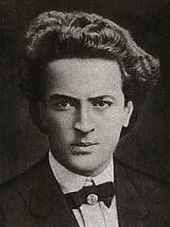Angelos Sikelianos
Angelos Sikelianos ( Greek Άγγελος Σικελιανός , born March 15, 1884 in Lefkada , † June 19, 1951 in Athens ) was a Greek poet and founder of the esoteric "Delphic Idea".
Life

Born and raised on the island of Lefkada in the Ionian Sea , Sikelianos graduated from high school in 1900 and enrolled in the law faculty of the University of Athens the following year without completing his studies. From an early age he was enthusiastic about literature and read ancient Greek poets like Homer and Pindar , Plato and the Bible as well as contemporary European writers like Gabriele d'Annunzio . He traveled a lot during his studies and eventually turned to poetry and theater.
In 1907 he married in the United States , the York from a wealthy New family originated American Eva Palmer (1874-1952), which he in Paris had met, where they then Archeology and choreography studied. In 1908 the two settled in Athens, where Sikelianos came into contact with like-minded intellectuals. In 1909 he finally published his first volume of poetry Alafroïskiotos (Αλαφροΐσκιωτος), which attracted great attention in literary circles and is considered a milestone in the history of modern Greek literature. This was followed by a phase of looking for orientation until he published another four volumes between 1915 and 1917. In addition, during this time he worked on several contemporary literary magazines.
After the failure of the "Delphic Idea", he and Eva divorced in 1934. She moved back to the USA, from where she only returned to Greece after the death of her husband. Sikelianos married Anna Karamani (1904-2006) in 1940. During the German occupation 1941-44, Sikelianos played an important role in the intellectual resistance; In 1943 he gave a highly acclaimed eulogy for his friend, the poet Kostis Palamas . In 1946 he was elected President of the Greek Writers 'Union, from 1946 to 1951 he was nominated by the Writers' Union for the Nobel Prize for Literature . Right-wing circles in Greece prevented an award with their massive criticism. He died in Athens in 1951 and was buried in Delphi.
plant
Sikelianos' work shines through its strong lyrical orientation and its particular linguistic richness. To this day he is one of the most important and influential modern Greek poets; Nevertheless, with the exception of the English-speaking countries, it has hardly been received outside of Greece.
The Delphic Idea
In the 1920s, Sikelianos became famous for his attempt to revive the Pythian Games of Delphi . The “Delphic Idea” ( Δελφική Ιδέα ) was about much more than literature, he propagated the end-time vision of a society characterized by harmony and enlightenment, based on that developed by Saint-Yves d'Alveydre at the end of the 19th century Synarchy model . D'Alveydre understood it to be a theocracy led by an esoteric circle, that is, by "initiates" . Delphi was chosen as the center of the world with reference to d'Alveydre's mythical design of an ancient Greek giant state . Financially and ideally supported by his wife, Sikelianos promoted his thoughts with lectures and articles, so that in 1927 and 1930 The Fettered Prometheus and in 1930 The Protective Plea of Aeschylus could be performed in Delphi according to ancient Greek dramaturgy. As in ancient times, the festival also included athletic competitions such as discus throwing, javelin throwing and wrestling. In addition, the Delphic Association ( Δελφική Ένωση ) should be founded, an international association for international understanding, as well as a University of Delphi with the aim of uniting the literary traditions of all peoples in a common myth. In 1929 he was awarded the silver medal by the Academy of Athens for these plans . However, only the two Delphic Games took place with free entry for all visitors, further performances could not be realized due to lack of money due to the non-commercial nature of the events.
Trivia
Sikelianos owned a country house on Salamis , directly opposite the Faneromeni monastery . King Paul of Greece is said to have visited him there regularly on the way to the port.
Works
Single issues
- Poetry: Λυρικός Βίος , 3 vols. (Selection), 1946–47.
- Tragedies: Θυμέλη , 3 vols., 1950–54.
Complete edition
- Άπαντα , 6 vols. (Edited by Georgios Savvidis ), 1965–69.
swell
- John P. Anton (Ed.): Upward Panic. The Autobiography of Eva Palmer-Sikelianos. Harwood Academic Publishers, 1993 ( on Google Books )
- Anna Sikelianu, Η ζωή μου με τον Άγγελο , Athens 1985.
literature
- Markos Avgeris, Άγγελος Σικελιανός , Athens 1952, ²1966
- Ritsa Frangu-Kikilia, Άγγελος Σικελιανός , Athens 2002.
- Thomas Heinzel: White Brotherhood and Delphic Idea. Esoteric religiosity in Bulgaria and Greece in the first half of the 20th century. (Erfurt Studies on the Cultural History of Orthodox Christianity, Vol. 9) Peter Lang, Frankfurt / Main 2015
- Pantelis Prevelakis, Άγγελος Σικελιανός , Athens 1984.
- Anna Sikelianu, Ο ποιητής Άγγελος Σικελιανός , Athens 2002.
- Michalis Stafilas, Άγγελος Σικελιανός , Athens 1989.
- Theodoros Xidis, Άγγελος Σικελιανός , Athens ²1979.
Individual evidence
- ↑ Thomas Heinzel, 2015, p. 141
| personal data | |
|---|---|
| SURNAME | Sikelianos, Angelos |
| ALTERNATIVE NAMES | Άγγελος Σικελιανός (Greek) |
| BRIEF DESCRIPTION | Greek poet |
| DATE OF BIRTH | March 15, 1884 |
| PLACE OF BIRTH | Lefkada |
| DATE OF DEATH | June 19, 1951 |
| Place of death | Athens |
